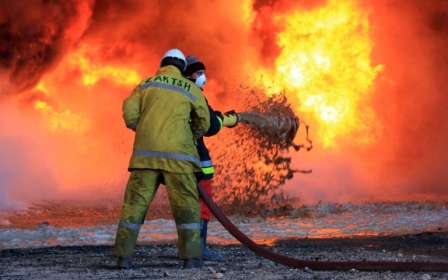US won't seek death penalty against Libyan charged in Benghazi attack

By Olivia Hamton
US prosecutors said on Tuesday that they will not seek the death penalty against a Libyan charged over the Benghazi attacks that killed Washington's ambassador and three other Americans in 2012.
Ahmed Abu Khatallah, who was captured by US special forces two years ago and brought to the United States on a US Navy ship, is facing an 18-count indictment over the killings at an American diplomatic and intelligence compound.
His lawyers had unsuccessfully sought to have the case dismissed and have Khatallah returned to Libya. They had pressed hard for the death penalty to be removed as a possibility should Khatallah be convicted of a capital crime.
"The United States of America ... hereby gives notice that the government will not seek imposition of the death penalty if the defendant is convicted of any capital crime charged in this case," US Attorney Channing Phillips wrote in a notice filed with the US District Court in Washington.
Justice Department spokeswoman Emily Pierce said US Attorney General Loretta Lynch reached the decision to drop the death penalty after consultation with prosecutors.
"The department is committed to ensuring that the defendant is held accountable," Pierce said in a statement.
With the death penalty now off the table, Khatallah faces a maximum penalty of life in prison if convicted.
"We believe this was the correct decision and are pleased that the attorney general made the decision on the merits without political considerations," the defendant's lawyer Eric Lewis told AFP.
"It is a very important development, but the case will be fought hard on the merits."
Political ramifications
The charges against Khatallah, who has pleaded not guilty, include murder of an international protected person - late US ambassador to Libya Chris Stevens - providing material support to terrorists and destroying US property by causing death.
The suspect, believed to be 45 and also known as Ahmed Mukatallah or simply "sheikh," was identified by the US State Department as a senior leader of Ansar al-Sharia, a Libyan group responsible for a spate of attacks and assassinations.
The assault saw gunmen storm the US mission in Benghazi and set it on fire.
A CIA annex was also targeted in the attacks that shocked Washington, quickly growing into a highly charged political issue that has embroiled White House contender Hillary Clinton due to her role as the top US diplomat at the time.
Republicans led congressional investigations into the prominent Democrat's handling of the attacks. During the course of the probe, it was revealed that Clinton used a private email server for both official and private correspondence.
The FBI launched a criminal investigation amid charges that her use of a private email server endangered national security.
The Benghazi attack also raised questions about security at US diplomatic facilities worldwide and the accuracy of US intelligence on militant threats.
Stay informed with MEE's newsletters
Sign up to get the latest alerts, insights and analysis, starting with Turkey Unpacked
Middle East Eye delivers independent and unrivalled coverage and analysis of the Middle East, North Africa and beyond. To learn more about republishing this content and the associated fees, please fill out this form. More about MEE can be found here.




